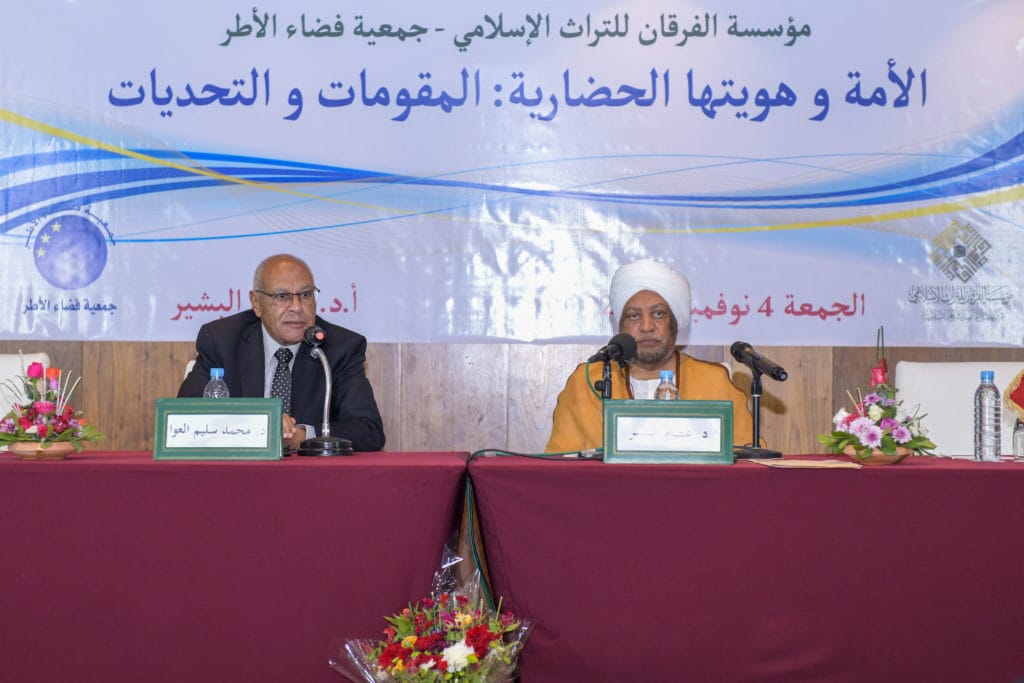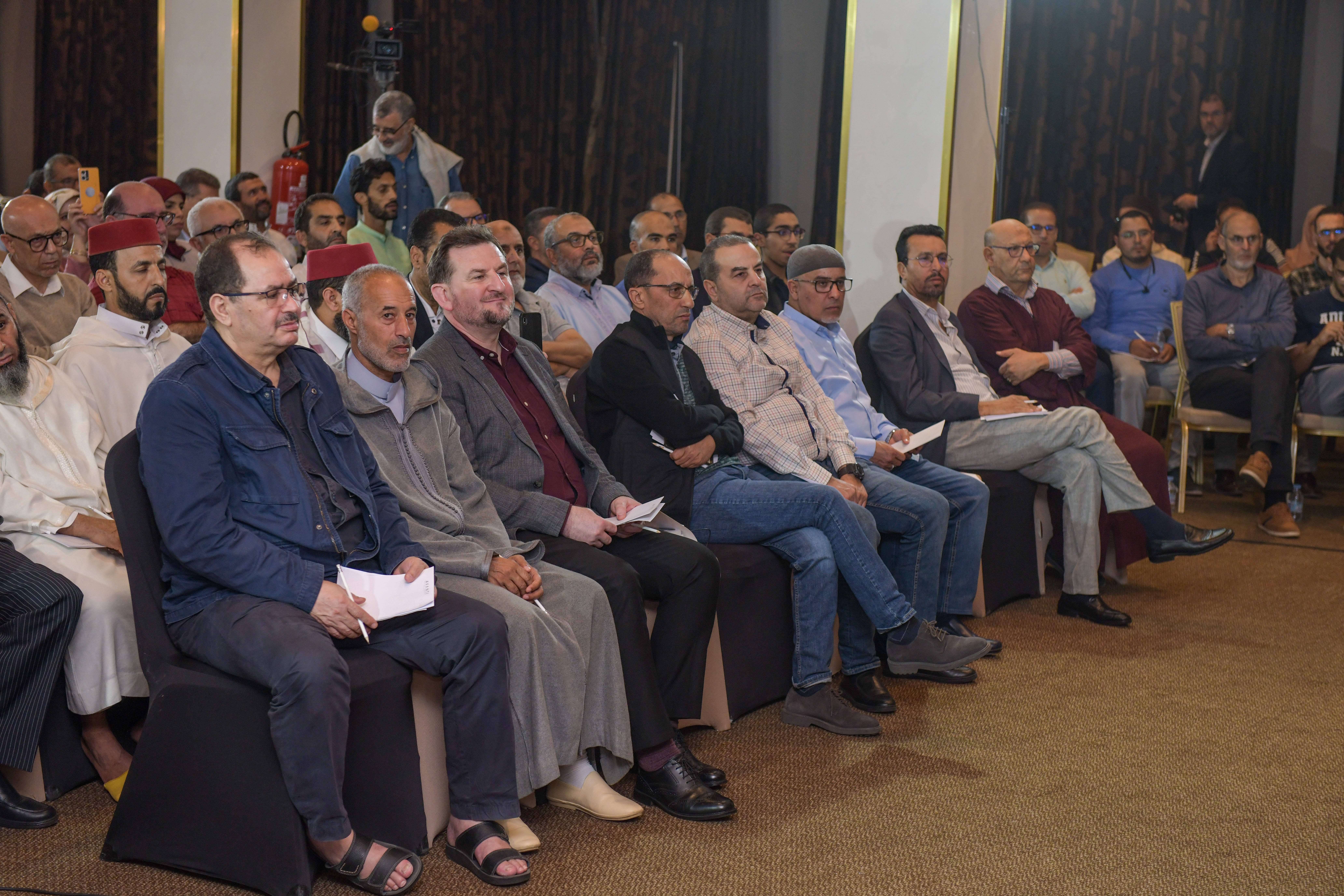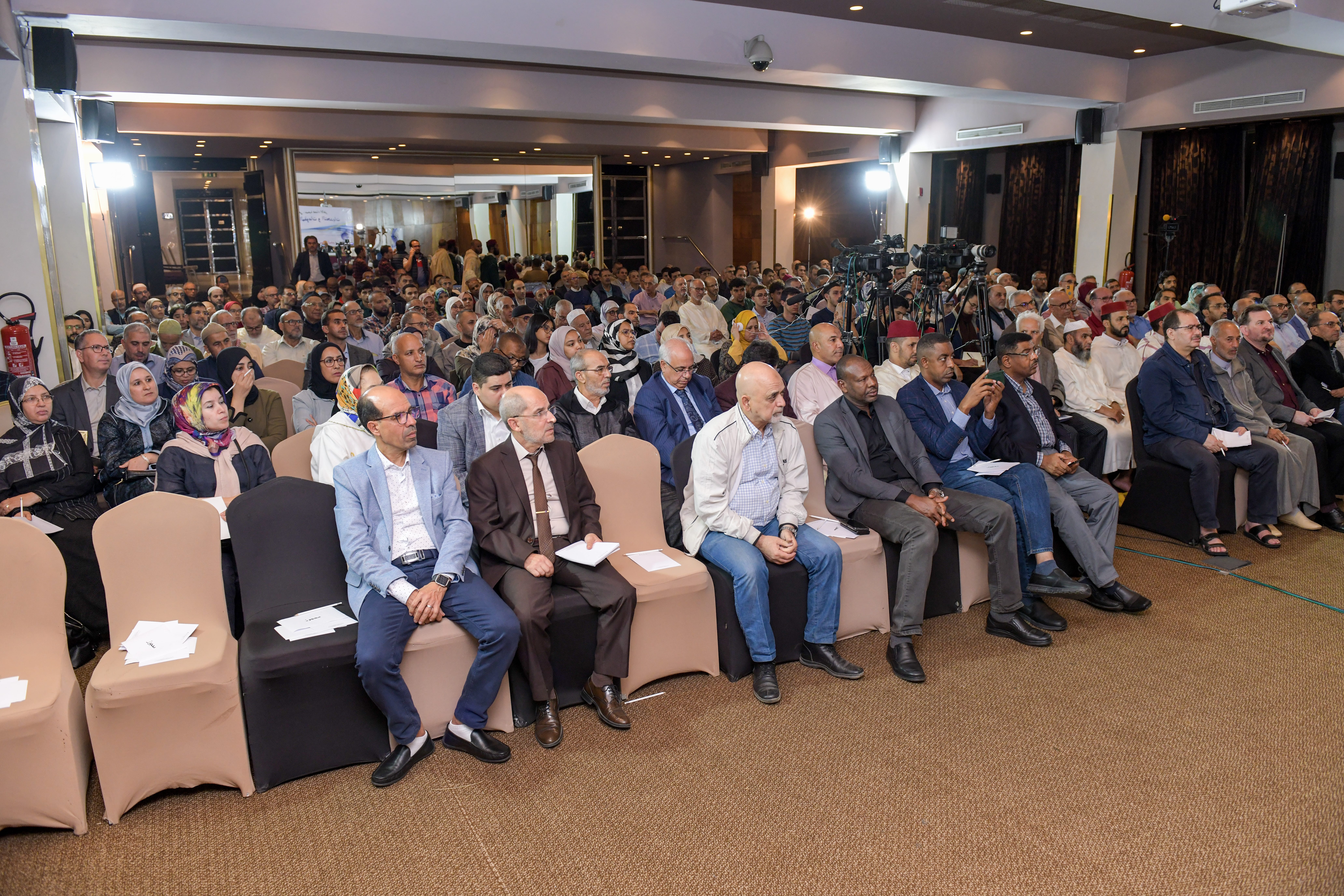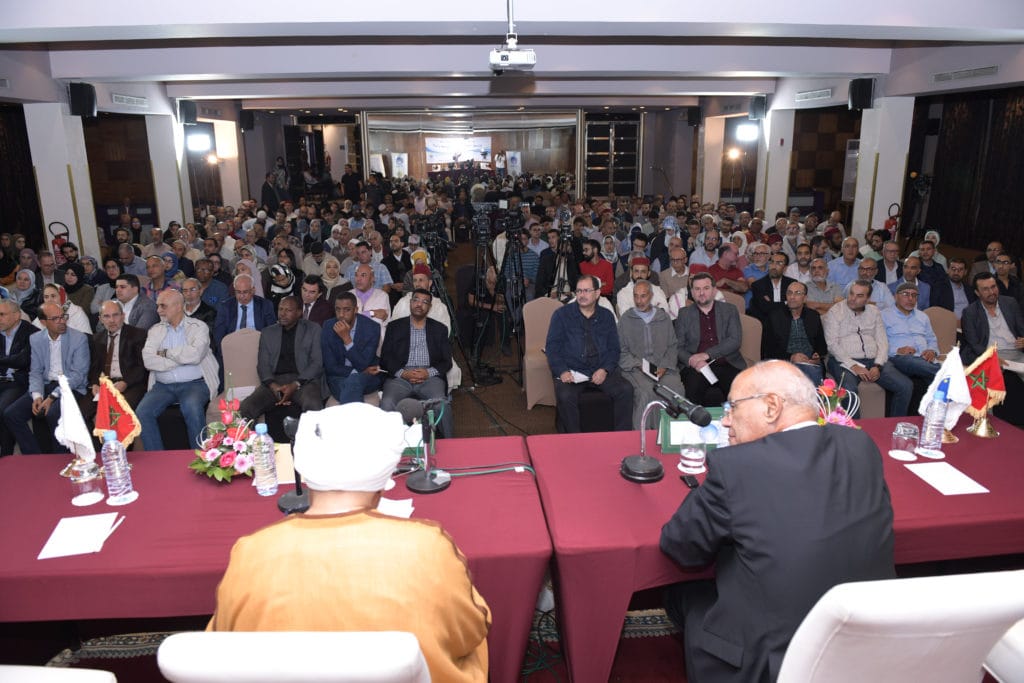Lecture Professor Issam al-Bashir
The Centre for Study of the Philosophy of Islamic Law at Al-Furqān Islamic Heritage Foundation, in partnership with Association Espace Cadres at Mohammedia, organised a scientific lecture, “The Muslim nation and its civilisational identity: Constituents and challenges”, by the esteemed erudite scholar, Dr Issam al-Bashir. The event held at the Avanti Mohammedia Hotel, on Friday, 4 November 2022CE, was chaired by Dr Mohammad Salim al-Awwa.

The lecturer commenced his talk by thanking both organising bodies, and the chair, the erudite Dr Mohammad Salim al-Awwa. He began by explaining the meaning of the term, “ummah”, from the dictionary, “Lisān al-‘Arab”, namely ‘a group sharing a common circumstance or description’. He mentioned that it is used in the Qur’ān to convey four distinct meanings. The first being the leader (imām) to be taken as a role model; Allāh, the Almighty says: (Indeed, Ibrāhīm was an ummah) [Sūrah al-Naḥl 120], i.e. a leader, who is followed in his standing of example and as a role model. The second is in the sense of a species or kind among others; Allāh, the Almighty says: (There is no creature crawling on the earth or flying creature, flying on its wings, but who are many (ummah) species just like yourselves) [Sūrah al-An‘ām 38]. It is recognised that the group comprising a species or kind may be so by Divine Decree or choice. The third sense of ummah is a period of time; Allāh, the Almighty says: (…remembering after a (ummah) period…) [Sūrah Yūsuf 45], i.e. after a period of time. The fourth sense is that of a people of a sect and religion, regardless of whether this religion is considered true or not; Allāh, the Almighty says: (…We found our fathers following a (ummah) religion…) [Sūrah al-Zukhruf 22], where some of that heritage was not valid, and rejected by the Noble Qur’ān; on the other hand, it may be a collective for the truth: (…Among the people of Musa, there is a (ummah) group, who guide by the truth…) [Sūrah al-A‘rāf 159]. Dr Issam pointed out that the religion of all Prophets is one—Islam. The word, Islam, embodies two meanings; the first is to surrender, comply, and submit to Allāh, the Almighty. The second refers to the collection of commandments revealed to the Prophet Muḥammad, peace be upon him. These meanings are given in the Qur’ān: (The religion in the sight of Allāh is Islam …) [Sūrah Āl-‘Imrān 19], and (If anyone desires anything other than Islam as a religion, it will not be accepted from him, and in the Next Life he will be among the losers) [Sūrah Āl-‘Imrān 85].
The lecturer added that the Prophets and Messengers preached one religion, with respect to principles (uṣūl), universals (kulliyyāt), and foundations, with diversity in laws. Indeed, our Muslim nation is united on the absolutes (thawābit), principles, certainties (qaṭ‘īyyāt), and the unambiguous (muḥkamāt), yet is diverse in the branches (furū‘) and particulars (juz’iyyāt), commensurate with capacities of comprehension, in the processes of linking to textual evidence (ta’ṣīl) and assigning to specific cases (tanzīl). Dr Issam stated that Allāh endowed this nation with three grand attributes. First, it is the nation of the word of monotheism (tawḥīd) and unity of word; (Indeed, this nation of yours is one nation and I am your Lord, so worship Me) [Sūrah al-Anbiyā’ 92]. The second is that it is the nation of the middle path (wasaṭ) and moderation (i‘tidāl); (In this way, we have made you a middlemost (wasaṭ) community…) [Sūrah al-Baqarah 143]. Thus, achieving the status of being witness over people by virtue of being the middlemost. The third attribute is that it is the nation of invitation (da‘wah) and guidance (hidāyah) to Islam; Allāh, the Almighty says: (You are the best nation ever to be produced before mankind. You enjoin the right, and forbid the wrong…) [Sūrah Āl-‘Imrān 110].


In this context, Dr Issam dwelled on the meaning of the term, ‘wasaṭ’, stating that it expresses three meanings: middlemost, which Allāh made an integral quality of this nation; it is witness over people, and exercises civilisational authority by virtue of this attribute. Furthermore, ‘wasaṭ’ expresses the meaning of justice (‘adl), which includes integrity (khayriyyah). It also means the commendable balance protecting the individual from falling prey to the opposing extremes of excess or negligence, overindulgence or passivity… Thus, the term, ‘wasaṭiyyah’, encompasses all three meanings: integrity, justice, and commendable balance.
By virtue of this ‘wasaṭiyyah’, we can treat extremism that began by declaring society unbelieving (takfīr), then gravitated to deadly violence; moreover, it is opposite, the extremism of awed defeatism that began with desensitisation and concluded with embellishment; the stagnant trend that lives off the past, dwells in it, and is captive to it; and the contentious trend that thrives in a conflict-charged environment.
Furthermore, this ‘wasaṭiyyah’ is not hedonistic, to be shaped by whims and moods, nor is it hostage to one of two positions, shackled to the past or irreverent towards it. Neither is it neutered, as it does not bend to pressure, of any shape or kind; (…and beware of them lest they lure you away from some of what Allāh has sent down to you…) [Sūrah al-Mā’idah 49]. Furthermore, it does not justify or legitimise any deviance in the name of religion. Through this integrity, justice, and balance, it presides over all nations and civilisations. It is the means for the Muslim nation to be transported from the position of potential to civilise, to that of civilising action.
The third attribute or constituent: it is the nation of invitation and guidance. Indeed, in the Noble Qur’ān, guidance is presented as of two kinds, namely guidance of exposition and promulgation, and that of inspiration and attainment of success. The first is the job of Prophets and Messengers, and their followers of guides, righteous persons, and disciples. The second is from Allāh, the Almighty, exclusively. The Noble Qur’ān conditioned invitation to Islam through commanding good and forbidding evil. First, it is grounded on two matters, namely the existence of the will to change, and managing the change. The Prophet, peace be upon him, said: “The most beloved names to Allāh are ‘Abd Allāh and ‘Abd al-Raḥmān, and the most sincere are Ḥārith and Humām”. The name, Humām, indicates the presence of will; the will to change, which needs management to translate it into reality.
This nation is firmly established on: the unity of reference based on the Noble Qur’ān and Prophetic Sunnah; unity of leadership embodied in the person of the Prophet, peace be upon him; and unity of homeland. Among the attributes of this nation, is that there is no one cultural centre, rather many cities and capitals; Makkah, Madinah, Damascus… Among its attributes is that diverse races assumed its leadership—Arabs, Abyssinians, Berbers, Turks, and Mongols. The Muslim nation was able to assimilate many peoples and races into a broad fabric. Some races and peoples were affiliated to the Islamic civilisation in language and culture, but not religion, like the Copts of Egypt. Others were part of Islamic civilisation through religion, but not language, such as Abyssinians, Turks, and Berbers… There were those, who were shaded by this Islamic civilisation; its diversity and benevolence accepting and absorbing non-Muslims with respect to common humanity, religion, and civilisation. Thus, there were those affiliated to it, but not by religion or language, such as the Assyrians and Chaldeans. However, today it faces a number of challenges, with which we conclude our discussion, namely:
The issue of deconstruction and composition in the concept framing this nation, and its identity that expresses the reality of the self in the relevant unambiguous matters, universals, and principles, between the specific and general affiliation. Indeed, there is no contradiction with affiliation based on nation, neighbourhood, creed, or simple humanity, among others.
The challenge of targeting this nation’s unity on the basis of scattering the scattered, separating the separated, or dividing the divided, whether on doctrinal, sectarian, or racial lines. The schools of doctrine were established to serve religion, and were diverse; however, creed, jurisprudential, ideological, or movement doctrines led to a state of fanaticism and fragmentation, and basis for professing loyalty or disavowal (al-walā’ wa al-barā’). These doctrinal schools represented a means of enrichment and potency, and the purpose was not to stagnate upon it. Therefore, we should not deal with these schools of thought with a mind-set of contempt or sanctity, or stagnation or negation.
The challenge in the Muslim nation’s relationship with the other. This other does not signify the adversary, or a constant, unchanging and irrevocable, state of hostility. Indeed, the default in our relationship, i.e. the relationship of our nation with other nations is: first, belief in the common human origin, as humanity shares in servitude to Allāh and in being offspring of Adam. Second, belief in the absolute ennoblement of all humans; (We have honoured the sons of Adam…) [Sūrah al-Isrā’ 70], in his human description. Third, brotherhood in humanity, applying this has priority over neglecting it, as all the slaves are brethren. Imām ‘Alī, may Allāh be pleased with him, said: “people are one of two kinds: either a brother of yours in Islam, or your counterpart in creation. They produce mistakes, are overcome by shortcomings, and commit with their hands with premeditated intent and error; so grant them of your pardon and forgiveness, as much as you wish that Allāh grant you of His Pardon and Forgiveness; for you are above them, and the one in authority is above you, and Allāh is above the superiors of those in authority”. Fourth, belief that difference between humankind in creed is a reality by the Will of Allāh, and there is no denial of His Will, or to His Ruling. The fruit of these differences is that humans may come to know one another, and not negate one another. The word, (li ta‘ārafū), embodies three meanings: knowledge (ma‘rifah), mutual recognition (ta‘āruf), and accepted good (ma‘rūf). Fifth, the grand rule, stated by Allāh: (Allāh does not forbid you from being good to those who have not fought you in the religion or driven you from your homes, or from being just towards them. Allāh loves those who are just) [Sūrah al-Mumtaḥanah 8]. The world today is in need of a pact like the pre-Islamic pact of nobles (ḥilf al-fudūl), given international institutions with skewed standards and imbalanced scales; one in which every person of conscience participates, based on unified standard, and sound balance. Finally, there are challenges facing the Muslim nation in the aspect of civilisation; the Muslim nation exists, but is absent. Presence is different to existence. Presence signifies dynamism, initiative; however, the Muslim nation is not an actor, but passive submissive. Presence is of two kinds; presence in time and presence in space. He also discussed the challenges presented by atheism, corrupting the innate nature (fiṭrah) by negating it, sexual deviance that is the challenge of base desires, the challenge of casting doubts on the absolutes of the whole religion, starting with the Noble Qur’ān and the Prophetic Sunnah… the challenge of family breakdown, and the challenge of youth hopelessness.
Dr Issam concluded his talk by explaining the meaning of unity of the Muslim nation, taking various forms and kinds in terms of essence. This nation is one that is treated by Allāh with mercy, and is not subject to the natural laws that afflicted other civilisations; since Allāh will not leave any era without a warner with manifest proof.


